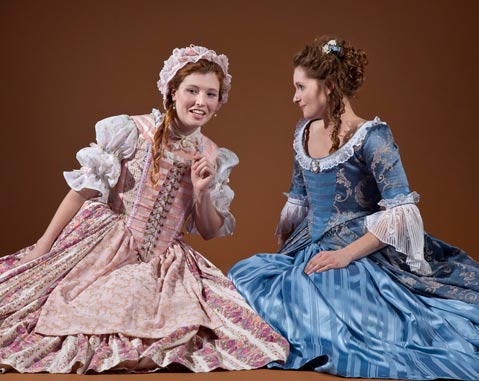She Stoops to Conquer at UCSB
Oliver Goldsmith’s Classic Comedy of Mistaken Identity and Imposture

What woman could resist the chance to see how a potential romantic partner acts when she’s not around? And what man behaves as well when being served by the help as he does when he knows an eligible heiress is judging him? These are the twin questions around which Oliver Goldsmith’s classic 1773 comedy She Stoops to Conquer revolves. When the mischievous Tony Lumpkin sends Charles Marlow to the mansion of his potential wife, the heiress Miss Kate Hardcastle, he leads him to believe that he will actually be entering an inn. Taking the lord of the manor for an innkeeper and his beautiful daughter for a servant girl, the protagonist of She Stoops lets down his guard at the same time that the knowing Kate plays along with his mistake. The way that Miss Kate poses as a housemaid is the “stooping” imposture that gives the show its title and generates many of its laughs. In the production of She Stoops to Conquer opening at UCSB’s Hatlen Theatre on Friday, February 25, director Simon Williams’s young cast will be sure to wring every drop of humor and pathos out of this Enlightenment-era comedy. I spoke with Williams about the show last week.
Have you directed She Stoops to Conquer before? No. I’ve seen it before, but I’ve never seen it done well.
Are you changing the setting to another time period? No. The actors will be wearing beautiful 18th-century costumes, but the performances will be more Brechtian than realistic. We’re aiming for something that’s stylized but also spontaneous, all while retaining the language, of course, and adopting many of the 18th-century stage conventions. For example, some sections of the play will be presented as a kind of game. When the show begins, the stage will be bare, and the actors will gradually bring the various parts of the set on with them.
How is your cast feeling about the material? So far, the students love it. There’s a lot of heart to the story as the lovers come together, and they clearly like playing that.
Oliver Goldsmith wrote an essay on comedy around the time that he wrote this play. Has that entered into your thinking about the work? My program note will begin with some mention of Goldsmith’s essay comparing laughing and sentimental comedy. In it, Goldsmith says that there has been too much praise for virtue in the sentimental comedy, but I think it’s a mistake to see him as advocating a return to the type of comedy that was popular in the Restoration. His idea of “laughing” comedy is closer, in many ways, to what we today would call situation comedy. What he’s after is not speeches, but subtext, and I think that’s why this play really is the foundation of contemporary comedy.
Is the language challenging for young actors? Perhaps, but we’re not changing the language at all. These students are really flourishing in the program at UCSB, and one thing they’ve all been drilled in is the ability to communicate this kind of writing effectively. I can assure the audience that there will be no problem understanding them, because you will be able to hear absolutely every word.
What else have you noticed about the way the cast is coming along? The cliché in theater circles about training American actors is that they lack emotion, but that is certainly not the case with this group. Add to that the fact that this is unquestionably among the funniest plays ever written, and you have quite a potent combination. There are three or four minutes toward the end of the play when every character is onstage at once, and at that point, it has the same magical quality that you get in Shakespeare’s comedies—the sense of participating in a truly joyous occasion.
4•1•1
She Stoops to Conquer will be performed at UCSB’s Hatlen Theatre on Friday, February 25, and Thursday-Saturday, March 3-5, at 8 p.m.; and on Saturday, February 26, and Saturday, March 5, at 2 p.m. For tickets and information, call 893-7221 or visit www.theaterdance.ucsb.edu.



